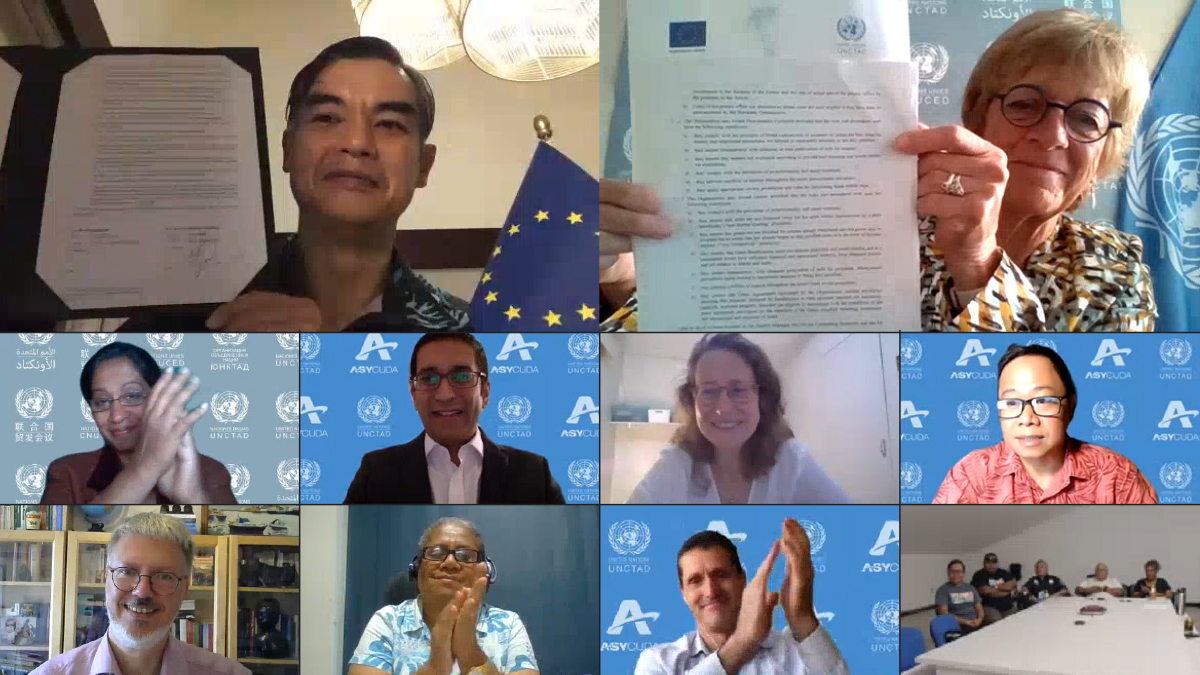A new project is poised to help countries in the region generate efficiencies in customs clearance processes and reap the rewards of easier international trade.
A container ship unloads cargo at a dock in Micronesia, a nation comprising more than 600 islands spread across the western Pacific Ocean. © Lightning Strike Pro
UNCTAD and the European Union (EU) on 24 September launched a project to streamline customs clearance processes in the Pacific region and to generate efficiencies facilitating international trade.
The project entitled “Improving Pacific Islands Customs and Trade” (IMPACT) worth $11.7 million (EUR 10 million) seeks to optimize border and customs procedures of Pacific Island countries, thereby boosting the region’s economies by facilitating regional and international trade.
“We appreciate working with the EU on increasing the pace of international trade in Pacific Island countries,” said Isabelle Durant, deputy secretary-general of UNCTAD.
EU ambassador for the Pacific, Sujiro Seam, said: “The IMPACT project is a key part of the Pacific Regional Integration Support Programme funded by the EU to facilitate and develop trade in the region and open new recovery paths from the negative socioeconomic impact of COVID-19.”
“In partnership with UNCTAD, the IMPACT project will thus contribute to sustainable and inclusive prosperity in the region, which is the first area of focus of the new EU strategy for cooperation in the Indo-Pacific,” he added.
Digital signing ceremony of the project agreement.
Strengthening regional commerce
The project further seeks to strengthen regional commerce by, for example, including trade facilitation aspects in national trade and investment policies.
It will benefit from UNCTAD’s Automated System for Customs Data (ASYCUDA) programme. ASYCUDA will facilitate regional and international trade by improving customs clearance processes through the delivery of its customs management software, as part of trade facilitation agreements.
Ms. Durant said that ASYCUDA, as part of the IMPACT project, can make a real difference to businesses – big and small – in the region and accelerate socioeconomic progress.
Generating efficiencies in customs clearance
With the harmonization of customs operations and the deployment of ASYCUDA software across all countries in the region, the project will support countries towards a faster and more efficient clearance processing.
It will also foster closer cooperation via the electronic exchange of trade data and production of accurate trade statistics.
“Greater efficiency will boost trade and growth, as well as income, and having access to more data enables better decision-making. These are important ingredients for better outcomes for the economy and this is what we need in these challenging times,” Ms. Durant added.
Cutting the costs of imports and exports
Reducing the time and charges associated with trading across borders is expected to reduce the cost of imports and exports, making sectors producing goods and providing services (including tourism) more competitive.
The IMPACT project will also benefit micro, small and medium-sized enterprises by ensuring the consistent application of trade-related laws and regulations, resulting in more predictable costs.
The World Trade Organization (WTO)’s Trade Facilitation Agreement (TFA) provides the most advanced international platform to facilitate trade.
This agreement comes with provisions that expedite the movement, clearance and release of goods, while promoting cooperation between customs and other authorities on trade facilitation.
The project will further assist Pacific countries with complying and benefiting from trade facilitation reforms, including among non-WTO members.
The beneficiaries of the project include the Cook Islands, the Federated States of Micronesia, Fiji, Kiribati, Nauru, Niue, Palau, Papua New Guinea, Marshall Islands, Samoa, Solomon Islands, Timor-Leste, Tonga, Tuvalu, and Vanuatu.
UNCTAD will also deliver activities to strengthen the institutional capacities of the secretariats of the Oceania Customs Organization and the Melanesian Spearhead Group to support countries’ trade reform initiatives beyond the duration of the 40-month-long project.


